Lexicon of the Hamas Organization
Mohammed Deif
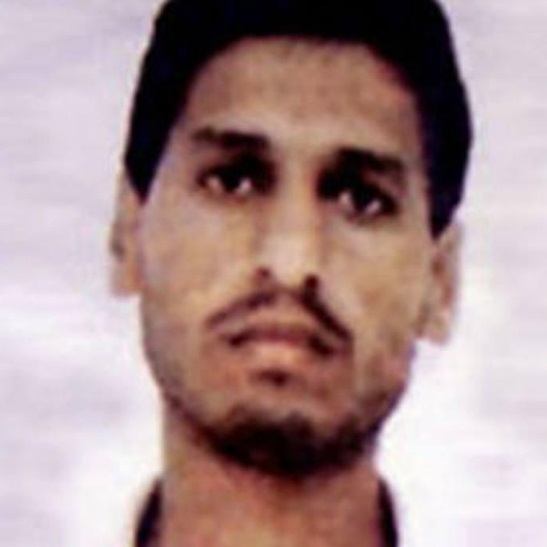
Mohammed Deif. Credit: ‘וואלה!’ FB page.
Mohammed Deif, born Mohammed Diab Ibrahim al-Masri in 1965 in Khan Younis refugee camp, in the Gaza Strip, and has been a significant figure in the Middle East’s tumultuous history. His life, characterized by a blend of early struggles and a controversial militant career, encapsulates the complexities of the Arab-Israeli conflict.
Early Life: Struggle and Education
Deif’s early life was marked by hardship and perseverance. Born in a family with roots in al-Qubeiba, Deif faced the challenges of living in a refugee camp. To support his low-income family, he worked in upholstery with his father and even started a small poultry farm. Despite these challenges, he was able to pursue education, graduating with a Bachelor’s degree in Chemistry from the Islamic University of Gaza in 1988.
Militant Career: Joining Hamas and Early Activities
Deif’s path took a significant turn in 1987 when he joined Hamas, just weeks after its establishment during the First Intifada. His involvement with the group led to his arrest by Israeli authorities in 1989. After 16 months of detention, he was released in a prisoner exchange, a pivotal moment that saw him help establish the Izz ad-Din al-Qassam Brigades, the armed wing of Hamas.
Leadership of the al-Qassam Brigades
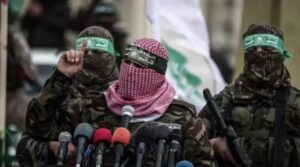
El Qasam Terrorists. Credit: Halima sadia’s FB page.
Deif’s ascension to the leadership of the al-Qassam Brigades came after the assassination of Salah Shehade in July 2002 by Israel. Despite being seriously wounded in an Israeli assassination attempt, which led to his deputy Ahmed Jabari taking over command between July 2006 and November 2012, Deif’s influence remained significant. In September 2015, the US Department of State added Deif, along with three other Hamas leaders, to the American list of Specially Designated Global Terrorists.
Strategic Transformation
Under Deif’s leadership, the al-Qassam Brigades transformed from a group of amateur cells to organized military units capable of conducting operations against Israel. He is credited with developing the ‘above and below’ strategy, which involved attacking Israeli territory with rockets and constructing underground tunnels for infiltrating Israel’s borders.
The 2023 Israel–Hamas War: Deif’s Role
In the context of the Arab-Israeli conflict, Deif’s role in the 2023 Israel–Hamas war stands out. As the highest-ranking leader of the al-Qassam Brigades, he orchestrated a surprise attack on Israel, initiating the war.
Legacy and Controversy
Deif’s legacy is one of controversy and complexity. He is a widely recognized terrorist, responsible for promoting terror and targeting civilians over three decades. His involvement in planning suicide bombings and attacks, such as the October 7th massacre. His development of the “Over and Under” attack method, which included constructing underground attack tunnels for Hamas terrorists to infiltrate Israel and firing rockets toward Israeli territory, further cements his legacy as a figure of terror.
In conclusion, Mohammed Deif’s life and career reflect the deep-seated complexities and ongoing strife of the Arab-Israeli conflict. From his early struggles in a refugee camp to his controversial role as the leader of the al-Qassam Brigades, his story is intertwined with the broader narrative of the Hamas-Israel military conflict.
Lexicon of the Hamas Organization
The Battle of Sufa
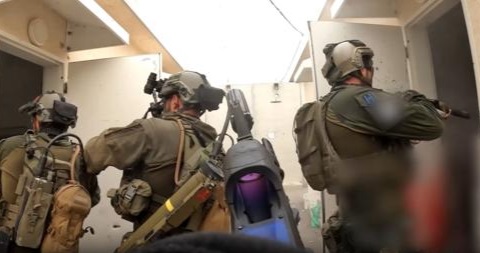
IDF’s Shayetet 13 force in Sufa. Credit: ‘YNET’ FB page.
Background History
The Battle of Sufa, which occurred on October 7, 2023, was a significant military engagement as part of Hamas’ Operation Al-Aqsa Flood. The village of Sufa, which borders the Gaza Strip, became the focal point of this conflict. It housed a military outpost manned by the Israel Defense Forces (IDF), in the Nahal Brigade’s Reconnaissance Unit, positioned only 3 kilometers from the border with the Gaza Strip.
Initial Ground Assault
The day began with a sudden and intense assault by Hamas on Israeli targets around the Gaza Strip, starting around 6 a.m. This operation included a barrage of rocket fire and a coordinated ground and air attack. The attackers initially faced resistance from a small group of armed civilians in Sufa, followed by the overtaking of the IDF outpost. The outpost’s Golani Brigade soldiers, caught off-guard, suffered casualties and some evaded capture by hiding inside a bunker.
Assault on the Outpost
In response, Israel’s elite Shayetet 13 unit, along with reservists, was rapidly deployed to the scene from their base in Atlit. Arriving by helicopter, these naval commandos engaged in heavy combat with the Hamas militants. Despite being significantly outnumbered, they managed to regain control of the outpost. Their intervention was crucial in turning the tide of the battle.
Shayetet 13’s involvement was pivotal, not only in combat but also in rescue operations. They coordinated with other IDF troops to rescue hostages and eliminate Hamas terrorists. In the midst of heavy fighting, they successfully eliminated more than 60 terrorists and rescued about 250 hostages. The battle saw some of Israel’s bravest, including Lt.-Col. Eli Ginzburg and First Sgt. Ofek Russo, lose their lives.
Evidence from Survivors
IDF’s Or Ben Yehuda. Credit: Diana Krayin’s FB page.
Survivor accounts highlight the intense and prolonged nature of the fighting. The Nahal Reconnaissance Unit engaged the terrorists for many hours, facing a situation of being outnumbered and nearly running out of ammunition. Reinforcements, including the Karakal Regiment led by Lt. Col. Or Ben-Yehuda and Shayetet 13, played a pivotal role in clearing the outpost of terrorists and rescuing hostages. The Shayetet 13 commandos were instrumental in saving some 250 hostages, including civilians and fellow soldiers.
The Battle of Sufa is remembered as a testament to the resilience and strategic capabilities of the IDF, particularly in the face of overwhelming odds. The success of the Shayetet 13 unit in rescuing hostages and eliminating the militant threat underlines the effectiveness of Israel’s military response to sudden and intense terrorist attacks.
Lexicon of the Hamas Organization
The Second Intifada
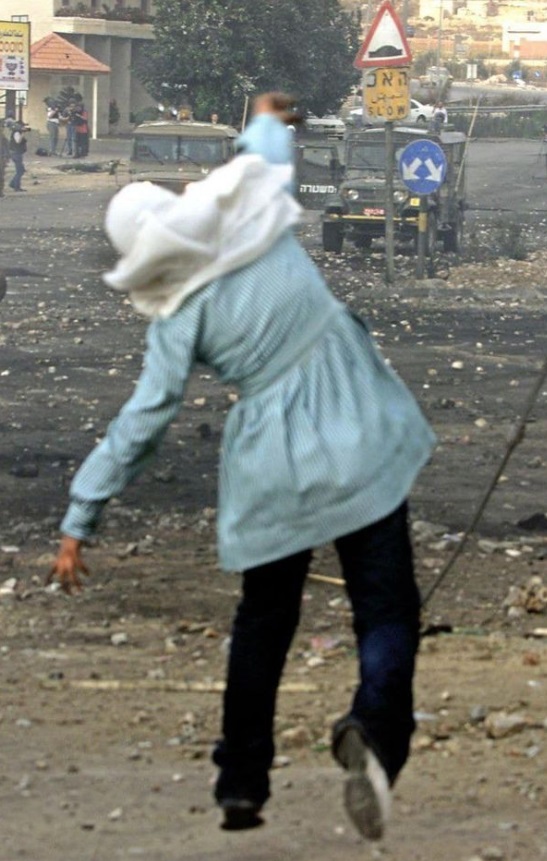
Second Intifada. Credit: Palestine ‘SunBird’ FB page.
The Second Intifada, also known as the Al-Aqsa Intifada, was a pivotal and intensely violent conflict in the Israeli-Palestinian history, spanning from 2000 to 2005. This comprehensive article delves into the background, timeline, impact on the Oslo Accords, and international involvement in this conflict.
Background
The Second Intifada emerged from a matrix of long-standing frustrations and immediate provocations. Key among these was the failure of the 2000 Camp David Summit, intended to achieve a final agreement in the Israeli-Palestinian peace process. The Oslo Accords, signed in 1993 and 1995, had set the stage for these talks. They included Israel’s commitment to withdrawing from parts of the Gaza Strip and West Bank and affirming Palestinian self-government in these areas. Conversely, the Palestine Liberation Organization recognized Israel and took responsibility for internal security in evacuated areas. However, the on-ground realities left both parties disillusioned.
Impact on the Oslo Accords
Oslo Accords Signing. Credit: ‘History In Pictures’ FB page.
The Second Intifada severely impacted the Oslo Accords. The Palestinians’ build-up of arms and security forces, in violation of the Accords’ terms, contributed to the breakdown of peace talks. The violence and distrust deepened, halting any progress toward peace and leaving both sides more entrenched in their positions.
International Involvement
Internationally, there were attempts to mediate peace, including the Arab Peace Initiative by the Arab League in 2002. This initiative proposed normalizing relations between Arab countries and Israel in exchange for a comprehensive peace agreement and the establishment of a Palestinian state. Despite wide support, this initiative was not implemented, and the conflict continues.
Context in Israeli – Arab Conflict
The Second Intifada is a defining moment in the Israeli-Palestinian conflict. It underscored the profound desperation and frustration of Palestinians and their commitment to fighting for freedom. Simultaneously, it highlighted the resilience of the Israeli state and its determination to maintain control over the Palestinian territories. The high death toll and the lack of significant progress towards resolution left a legacy of increased distrust and further complicated the Israeli-Palestinian relations.
Conclusion
The Second Intifada, with its deep roots in historical grievances and immediate triggers, not only resulted in significant loss of life and suffering but also marked a significant shift in the Israeli-Palestinian conflict. Its implications on the peace process, particularly the Oslo Accords, and the heightened international attention it drew, continue to shape the geopolitical dynamics in the region.
Lexicon of the Hamas Organization
The Oslo Accords
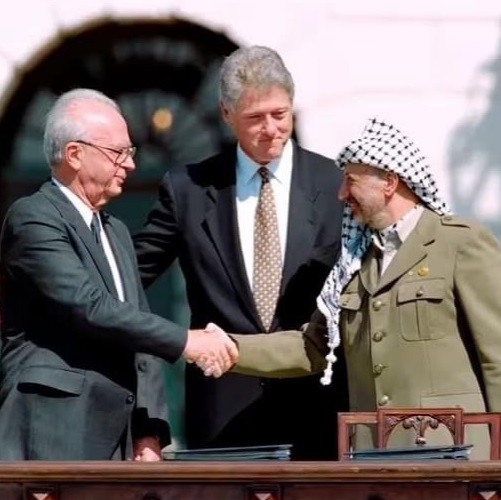
Israel PM Rabin, PLO president Araffat and USA President Bill Clinton signing Oslo Accords. Credit: ‘History in Pictures’ FB page.
The Oslo Accords, a cornerstone in the history of the Israeli-Arab conflict, represent a pair of pivotal agreements between Israel and the Palestine Liberation Organization (PLO). Initiated with the Oslo I Accord in Washington, D.C., in 1993, and followed by the Oslo II Accord in Taba, Egypt, in 1995, these accords marked the commencement of the Oslo process. This peace process aimed at achieving a peace treaty based on United Nations Security Council Resolutions 242 and 338, focusing on the Palestinian right to self-determination. The Oslo process began after secret negotiations in Oslo, Norway, leading to mutual recognition between the PLO and Israel. The PLO recognized Israel’s statehood, while Israel acknowledged the PLO as the representative of the Palestinian people and a partner in bilateral negotiations.
The Oslo Accords were rooted in the 1978 Camp David Accords, sharing similarities in their approach to peace. The Camp David Accords envisioned autonomy for the local Palestinian inhabitants of the West Bank and Gaza. At that time, Israel considered the PLO a terrorist organization and preferred to negotiate with Egypt and Jordan instead. The Oslo negotiations differed as they were direct dialogues between Israel and the PLO, aiming for an interim agreement to pave the way for a complete settlement.
Negotiation Partners
The negotiation process only gained momentum after Israel’s acceptance of the PLO as a negotiation partner. In the Letters of Mutual Recognition, signed just days before the Oslo I Accord, each party agreed to accept the other as a negotiation partner. The PLO acknowledged the State of Israel, and Israel recognized the PLO as “the representative of the Palestinian people”.
Outline of the Peace Plan
The Oslo Accords set goals including Palestinian interim self-government and a permanent settlement of unresolved issues within five years, based on Security Council Resolutions 242 and 338. A core aspect was the withdrawal of the Israeli military from Palestinian territories, planned to be executed in phases. This withdrawal was to be accompanied by a transfer of security responsibilities to Palestinian authorities. The first step involved a partial Israeli withdrawal from Gaza and Jericho and the transfer of some civil responsibilities to the interim Palestinian Authority.
Israel’s Withdrawal from the West Bank
The Oslo Accords stipulated the Israeli military’s withdrawal from populated Palestinian areas and the establishment of Palestinian elections to form a council that would replace the Palestinian Authority and dissolve the Israeli Civil Administration in the West Bank. Further redeployments of Israeli troops were planned upon the inauguration of the council, with the aim of dissolving the Israeli military government in the West Bank.
Permanent status negotiations on remaining issues were scheduled to start by May 1996 and conclude by May 1999. These negotiations were intended to lead to a peace treaty to end the Israeli-Palestinian conflict.
Contextual History of the Israeli-Arab Conflict
The Oslo Accords were born from a historical context of complex and prolonged conflict. The Israeli-Arab conflict has roots in the early 20th century, evolving through various phases, including the 1948 Arab-Israeli War, the Six-Day War of 1967, and the Yom Kippur War of 1973. These conflicts led to significant territorial changes and political shifts in the region, setting the stage for the eventual Oslo Accords.
Opposition and Criticism
The Oslo Accords faced significant opposition from both sides. Many Palestinians, including various militant groups, opposed the accords, with Palestinian-American philosopher Edward Said likening them to a “Palestinian Versailles.”
Conclusion
The Oslo Accords stand as a landmark in the Israeli-Arab conflict, representing a unique attempt at peace between Israel and the Palestinians. While they laid a foundation for future negotiations and temporary governance structures, the accords did not lead to a definitive resolution of the conflict. The creation of the Palestinian National Authority and the international acknowledgment of the PLO as Israel’s partner in negotiations were significant outcomes. However, the accords left many issues unresolved, including the status of Jerusalem, security control, and the Palestinian right of return.
The legacy of the Oslo Accords remains mixed. They symbolize a significant step towards peace but also highlight the complexities and enduring challenges of achieving a lasting resolution to the Israeli-Arab conflict.
-

 News3 months ago
News3 months agoGaza could Have Been Singapore. Hamas Turned It Into a living nightmare
-

 News3 months ago
News3 months agoRape, slaughter, and atrocities—see the real face of Hamas
-

 News3 months ago
News3 months agoKidnapping elderly and children: Hamas are no heroes
-

 News3 months ago
News3 months agoMonsters: Yahya Sinwar and Hamas kidnapped 150+ children and women.
-

 News3 months ago
News3 months agoTrigger warning: This is the atrocity that’s happening in Israel right now
-

 Hamas War Strategy, Tactics, and PR3 months ago
Hamas War Strategy, Tactics, and PR3 months agoThe War Crimes of Hamas and ISIS in Exploiting Civilians
-

 News3 months ago
News3 months agoShe died while saving lives.
-

 News3 months ago
News3 months agoHamas turns a music festival into a massacre






